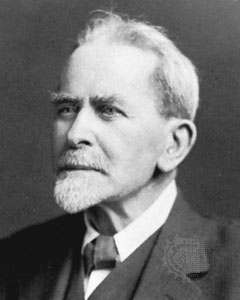James Frazer: Citáty anglicky
Zdroj: The Golden Bough (1890), Chapter 3, Sympathetic Magic.
Kontext: But once a fool always a fool, and the greater the power in his hands the more disastrous is likely to be the use he makes of it. The heaviest calamity in English history, the breach with America, might never have occurred if George the Third had not been an honest dullard.
Zdroj: The Golden Bough (1890), Chapter 4, Magic and Religion.
Kontext: From the earliest times man has been engaged in a search for general rules whereby to turn the order of natural phenomena to his own advantage, and in the long search he has scraped together a great hoard of such maxims, some of them golden and some of them mere dross. The true or golden rules constitute the body of applied science which we call the arts; the false are magic.
“They too, like so much that to the common eye seems solid, may melt into air, into thin air.”
Zdroj: The Golden Bough (1890), Chapter 69, Farewell to Nemi
Kontext: In the ages to come man may be able to predict, perhaps even to control, the wayward courses of the winds and the clouds, but hardly will his puny hands have strength to speed afresh our slackening planet in its orbit or rekindle the dying fire of the sun. Yet the philosopher who trembles at the idea of such distant catastrophes may console himself by reflecting that these gloomy apprehensions, like the earth and the sun themselves, are only parts of that unsubstantial world which thought has conjured up out of the void, and that the phantoms which the subtle enchantress has evoked to-day she may ban to-morrow. They too, like so much that to the common eye seems solid, may melt into air, into thin air.
“Thus the killing of a god may sometimes come to be confounded with the execution of a criminal.”
Zdroj: The Golden Bough (1890), Chapter 57, Public Scapegoats
Kontext: For when a nation becomes civilized, if it does not drop human sacrifices altogether, it at least selects as victims only such wretches as would be put to death at any rate. Thus the killing of a god may sometimes come to be confounded with the execution of a criminal.
“For myth changes while custom remains constant;”
Zdroj: The Golden Bough (1890), Chapter 49, Ancient Deities of Vegetation as Animals.
Kontext: For myth changes while custom remains constant; men continue to do what their did before them, though the reasons on which their fathers acted have been long forgotten. The history of religion is a long attempt to reconcile old custom with new reason, to find a sound theory for an absurd practice.
Zdroj: The Golden Bough (1890), Chapter 3, Sympathetic Magic.
Kontext: The natives of British Columbia live largely upon the fish which abound in their seas and rivers. If the fish do not come in due season, and the Indians are hungry, A Nootka wizard will make an image of a swimming fish and put it into the water in the direction from which the fish generally appear. This ceremony, accompanied by a prayer to the fish to come, will cause them to arrive at once.
Zdroj: The Golden Bough (1890), Chapter 5, The Magical Control of the Weather.
Zdroj: The Golden Bough (1890), Chapter 18, The Perils of the Soul.
Zdroj: The Golden Bough (1890), Chapter 9, The Worship of Trees.
Zdroj: The Golden Bough (1890), Chapter 58, Human Scapegoats in Classical Antiquity.
Zdroj: The Golden Bough (1890), Chapter 64, The Burning of Human Beings in the Fires.
Zdroj: The Golden Bough (1890), Chapter 3, Sympathetic Magic (See also: the Noble savage).
“The advance of knowledge is an infinite progression towards a goal that ever recedes.”
Zdroj: The Golden Bough (1890), Chapter 69, Farewell to Nemi.
Zdroj: The Golden Bough (1890), Chapter 1, The King of the Wood.
“For the present we have journeyed far enough together, and it is time to part.”
Zdroj: The Golden Bough (1890), Chapter 69, Farewell to Nemi.
Zdroj: The Golden Bough (1890), Chapter 18, The Perils of the Soul.
“In point of fact magicians appear to have often developed into chiefs and kings.”
Zdroj: The Golden Bough (1890), Chapter 6, Magicians as Kings.
Zdroj: The Golden Bough (1890), Chapter 27, Succession to the Soul.
Zdroj: The Golden Bough (1890), Chapter 21, Tabooed Things, § I : The Meaning of Taboo.
